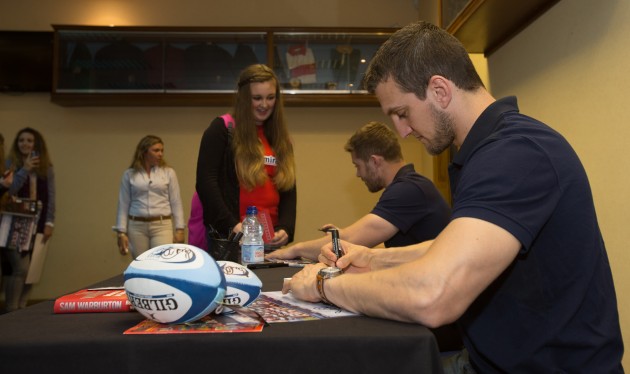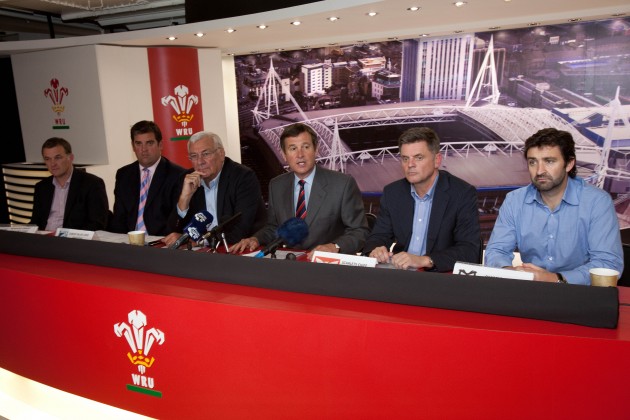Peace broke out in Wales early yesterday evening after one of the most protracted, tenuous talks in the history of the professional game.
Such has been the acrimony in between the WRU and RRW (Regional Rugby Wales) that there was no joint press conference for the cameras as both sides went their separate ways after signing the Rugby Services Agreement (RSA) which laid out a £60m six-year agreement that would take Welsh rugby into the next decade.
What was left, in the wake of an affair that has tested the patience of every Welsh rugby fan, was at least – on the face of it – marked progress.
For the avoidance of doubt, the disagreement has always been about money, or the lack of it. The regions felt they were being unfairly starved of the funds that would enable them to compete with English and Irish clubs, while the union was adamant they would not be made bankrupt by the demands of the regions. The regions felt increasingly that a salary cap of £3.5m simply did not give them enough to keep hold of their star players when compared to France – Toulouse have nearing a £28m annual salary – and this only led to steady flow of international players out of Wales.
Now at least, there seems to be more funds on the table with a sweetener of £500,000 per region on signing the RSA and the WRU guaranteeing £8.7m to the four regions. In that sum £2m has been allocated for dual-contracted players and that will be propped up by £1.3m of money from the Regions. Roughly speaking, dual-contracted players could be picking up a cool £330,000 a year, which should at least allow regions to compete with foreign clubs and keep players in Wales.
Elsewhere there is further framework in place to ensure the future of the game. The limit on foreign players has been capped at six per regional squad, plus two time-serving players, in effect, player who serving out their three-year residency rule before becoming eligible for Wales.
The responsibility for the Academies is passed back from the WRU to the Regions, where they will be given an annual £600,000 to nurture talent.
Further details include the WRU having the right to play up to 13 annual internationals, which will add to the coffers, and a 13-day release window to prepare for Autumn Series and Six Nations fixtures.
Another interesting development was the reintroduction of the A side to play a fixture, possibly before the start of the Six Nations, while in the shortened format, the RSA guarantees three players from the regions to be available for Wales Sevens selection.
The Group Chief Executive of the WRU, Roger Lewis, who has been heavily criticised during the drawn-out process, said: “The National Dual Contracts represented a radical step forward in our mutual aim of retaining Welsh talent here in Wales.”
Chairman of Regional Rugby Wales (RRW) Nigel Short commented: “Following long and detailed negotiations, RRW is satisfied that the new agreement with the WRU creates a fair, progressive and credible foundation to protect and support the best interests of Welsh Rugby into the future; with the core objective of delivering a sustainable and competitive professional game in Wales.
“The new agreement is a positive step forward for the long-term benefit of Welsh rugby with plenty of hard work still to be done to ensure that the game in Wales prospers, works in partnership and develops at all levels.”
What, perhaps, will be most frustrating to Welsh fans is that British and Irish Lions Leigh Halfpenny, Richard Hibbard and Jonathan Davies may still have been playing in Wales had the agreement had been signed earlier. Wales had already lost Lions George North, Mike Phillips, Jamie Roberts, Dan Lydiate and James Hook who had gone in search of stability and increased riches in the Premiership and Top 14. In effect, the horse has already bolted, and the only hope is that the new agreement will, in time, entice stars back to Wales.
One facet that will certainly raise eyebrows is the re-emergence of the fabled ‘Gatland’s law’, where players who choose to play outside Wales will not be available for selection, except for certain exceptional cases – this does not affect existing stars abroad but with come into effect once Warren Gatland picks six dual contract players – targeted players are thought to include Alun Wyn Jones, Taulupe Faletau, Gareth Anscombe, Gethin Jenkins, Alex Cuthbert, Scott Williams, Liam Williams, Ken Owens, Dan Biggar – alongside the only centrally contracted player Sam Warburton who controversially signed up in January.
Whether this can work remains to be seen, but a similar law has been in place in England and as with the case of Steffon Armitage, enforced, while Australia, New Zealand and South Africa have loosened their rigid stances.
The hard work starts now. Relationships need to be nurtured, trust rebuilt and the common aim of strengthening Welsh rugby as a whole put into force. If that happens, maybe, just maybe, Welsh rugby can prosper in the professional age.







